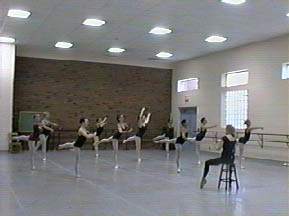Response Journal
Observing
Experiences
...from
a standards perspective
Renee' / Holly
|
Lights...Camera...Actions of the Pennsylvania Governor's School of the Arts were apparent in all aspects of our visitation. From the classroom visits to the performance of the Tibetan Monks, all exhibited an array of experiences that reflect the Fine Arts Academic Standards. |
|
|
When observing one of the theater classes, an acting technique focusing on character objectives in line delivery was being taught. The students were engaged in a scene dialogue where the instructor was verbally coaching the skill to ellicit the desired result from the students. It was a clear example of how a lesson can include the Pennsylvania Academic Fine Arts Standard 7.1. AN extension of this lesson that includes a critical response activity could also incorporate the Standard 7.3. This could be achieved through incorporating a full class discussion on the actors' choices in the scene that had just been presented and their effect. |
|
|
|
Along with the Mandala exhibit was a concert performed by the Tibetan Monks that included a traditional dance called the Skeleton Dance. It was a dance accepting the impermanence of our existence in this world. Using this dance (either by live viewing or video) could be an approach incorporating historical and cultural context [Standard 7.2]. This could include sharing the historical background of the Monks and their beliefs and traditions. Students could then discuss how those beliefs are manifested in the Skeleton Dance, and how those beliefs compare to the western cultural beliefs. Further discussions could take place addressing the Tibetan Monk's integration of the arts within their performance. |
|
As the music drew us to the ballet studio, we knew that we would be observing the morning technique class. It was apparent that the students were experiencing a beautifully designed lesson that included tactile teaching approaches, use of metaphor and precise demonstrations. Here again was another example of an effective use of the Standard 7.1 incorporated into the class design. |
AN extension of this lesson to include an aesthetic response component could incorporate the Standard 7.4. For example, discussing the effect of the music on the individual dancer during an adagio could allow them to respond to the connection between feeling, music and movement. Therefore encouraging the student to open themselves to the "wholeness" of the experience. |

